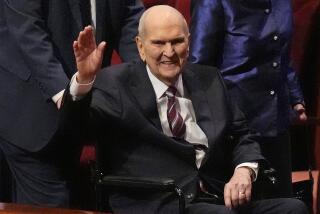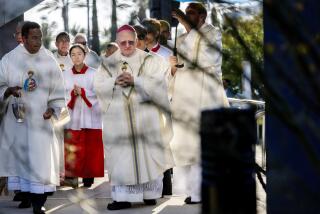Mormon Hierarchy to Cut Critics’ Funds
- Share via
The Mormon Church hierarchy, reacting to challenges to traditional doctrines about the Book of Mormon from its own membership, says it will not provide money to those who publicly discredit its teachings and leaders.
Elder Gordon B. Hinckley, who has directed the daily business of the 5.8-million-member church for nearly 2 1/2 years for its ailing President Spencer B. Kimball, declared last weekend that the Mormon Church does not fear honest scholarship.
Without mentioning New Testament scholar Stan Larson, who resigned under pressure last month from the church translations division, Hinckley said the salaries of detractors would not be paid.
“We are under no obligation to spend tithing funds to provide facilities and resources to those who have demonstrated that it is their objective to attack the church and undermine the mission,” Hinckley said.
In Larson’s case, he had submitted an article to the Journal of the Evangelical Theological Society in which he maintained that a portion of the Book of Mormon, the principal church scripture aside from the Bible, was taken directly from the King James Version of the Bible rather than from an ancient record inscribed on golden plates, as the Mormon Church claims.
Hinckley, 75, second counselor to Kimball, made the remarks during the church’s spring conference in Salt Lake City.
The 90-year-old Kimball attended the meeting but did not speak. He has been largely confined to his hotel apartment since surgery in 1981 to remove excess fluid from his brain.
While some instances of opposition to missionary activity overseas has concerned the Mormon leaders recently, the Utah-based church has taken steps lately to discourage research activities that tend to raise questions about faith rather than promote faith.
The Church Educational System no longer budgets expense money for its teachers to give papers at Mormon History Assn. conferences, and the church-run Brigham Young University has encouraged faculty members to deliver papers at BYU symposiums instead, according to a report in the Salt Lake City Tribune.
The association, which includes non-Mormons, has been a forum for frank discussion of letters in the hands of Mormon founder Joseph Smith and associate Martin Harris that reveal previously unknown elements of the story of the obtaining the golden plates. The 1830 Harris letter said Smith was rebuffed at first by a “white salamander” who transformed itself into an old spirit. Smith later said this was the angel Moroni.
Church officials have said the salamander, associated in magical lore with fire, could be equated with the bright, shining image of an angel.
But church spokesmen have not directly responded to the charge of “cover-up” by a source who last spring told The Times that he saw in the church offices a previously undisclosed, handwritten history of the church’s origins by another Smith associate, Oliver Cowdery.
The source said the book he saw states that Smith’s brother, Alvin, who died shortly after, was the one who first located the golden plates and was first fended off by a “taunting salamander.” Official church histories say Joseph Smith was directed to the location by an angel in 1823 and was allowed to take possession in 1827, but do not say Alvin Smith had a role in the discovery.
Adding to what he said in an earlier interview with The Times, the source said the history was written in the first person, as if dictated to Cowdery by Smith.
The closest a church official has come to commenting on the alleged Cowdery history may have been a speech charging news media bias in articles on the Mormon Church. In that talk Aug. 16 at BYU, Elder Dallin H. Oaks said truth is not always a sufficient reason for speaking out.
People who “reveal truths that they hold under obligation of confidentiality . . . are guilty of wrongdoing,” Oaks said. “The fact that something is true is not always a justification for communicating it,” he said. “By the same token, some things that are true are not edifying or appropriate to communicate.”
Also, criticism is “particularly objectionable” when it is directed at church leaders, “the Lord’s anointed,” Oaks said. “It does not matter that the criticism is true.”
Former California Congressman James C. Corman has been elected president of Americans United for Separation for Church and State, the 38-year-old religious-liberty interest group based in Washington.
Corman, a liberal Democrat, represented the east San Fernando Valley from 1961 to 1981. He was defeated by 752 votes in 1980 by Republican Bobbi Fiedler, who made opposition to mandatory school busing a major campaign issue. After his election defeat he moved to the Washington area and joined a law firm.
The Rev. Stephen Gustin, a Church of Nazarene pastor in Azusa, says now that he knew he “was good as out” of the denomination when delegates to the 21st Nazarene General Assembly at Anaheim last June reaffirmed in no uncertain terms their opposition to “speaking in tongues,” the utterances most characteristic of Pentecostal churches.
Gustin admitted then that he and much of his 200-member congregation used that “prayer language.” District Supt. Paul Benefiel of Pasadena said at the time that he had had assurances from Gustin that such was not the case.
But Nazarene delegates unanimously entered their traditional position into the Church Manual. “Previously, it was only the stated interpretation of the board of general superintendents,” Gustin said.
He said his congregation voted to sever ties with the denomination in July and has incorporated itself under a new name, the Berean Christian Center.
It is still in the same place, however. The congregation is leasing the building for at least two years from the denomination, Gustin said.
More to Read
Sign up for Essential California
The most important California stories and recommendations in your inbox every morning.
You may occasionally receive promotional content from the Los Angeles Times.












